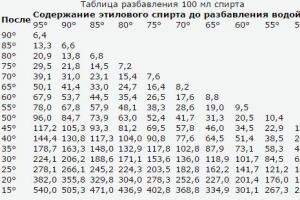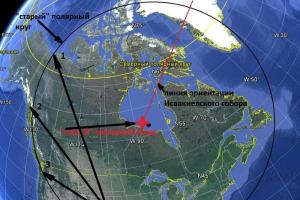Polish belongs to the Lechitic subgroup of West Slavic languages and is the official language of Poland. It ranks third in terms of the number of speakers among the Slavic languages, after Russian and Ukrainian. The Polish language became much more homogeneous in the second half of the 20th century, thanks in part to the mass emigration of several million Poles from the eastern to the western part of the country following the Soviet Union's 1939 occupation of the so-called "Eastern Borderlands" - the territories of what is now western Ukraine, Belarus and Lithuania. formerly part of Poland. Residents different regions Poland speaks the “standard” language slightly differently, although the differences between these “dialects” are not significant at all.
Being a fully inflected language, Polish has retained Old Church Slavonic case system with seven cases for nouns, pronouns and adjectives: nominative, genitive, dative, accusative, instrumental, prepositional, vocative. True, the vocative case is used mainly in formal contexts, and in colloquial speech it is replaced by the nominative case, and therefore the address Janie! (“Jan!”) is perceived as less familiar than Jan!. Interestingly, the vocative case is almost always used for insults: idioto! ("idiot!").
In modern Polish language There are only two classes of numbers - singular and plural. Previously there was also a dual number, but this form disappeared around the 15th century, and now the few relics of the dual number are found only in proverbs and sayings, for example, Mądrej głowie dość dwie słowie ("Two words are enough for a smart person") instead of the grammatically correct option Mądrej głowie dość dwa słowa.
Like most other Slavic languages (with the exception of Bulgarian and Macedonian), Polish does not have a definite or indefinite article.
System grammatical genders quite complex, since it combines three categories: gender (male, female, neuter), personality and animacy. The categories of personality and animacy apply only to masculine nouns. The result is a system consisting of five gender classes: masculine personal nouns and pronouns, animate (impersonal) masculine, inanimate masculine, feminine and neuter.
The gender classification of masculine nouns does not always correspond to their semantics (animate or inanimate noun). In particular, the category of grammatically animate nouns includes numerous nouns that denote inanimate concepts (for example, cukierek - “candy”, papieros - “cigarette”), as well as nouns used figuratively to refer to people (gieniusz - “genius”).
Polish verbs vary according to gender, person and number, but the tense system has been greatly simplified due to the disappearance of three tenses (aorist, imperfect and past perfect), which are now replaced by the so-called “Slavic perfect”. The Polish language distinguishes three tenses (present, past, future), three moods (indicative, imperative, conditional), three voices (active, passive, reflexive), two types (perfect and imperfect).
The basic word order in a sentence is Subject-Predicate-Object, but since Polish is a synthetic language, the word order can be changed. And the subject and predicate can be omitted if they are obvious from the context. The order of words can perform a semantic distinguishing function: Alicja ma kota (“Alice has a CAT”). – Alicja kota ma (“Alice HAS a cat”). – Kota ma Alicja (“ALICE has a cat”).
A characteristic feature of Polish syntax is the use of “polite” forms consisting of the word pan/pani (“lord”/“madam”) and a verb in the 3rd person singular as forms of the 2nd person plural: Pan/Pani idzie (“Mr/Madam is coming”) instead of Wy idziecie (“You are coming”). The use of personal pronouns in a sentence is not necessary: Idziecie (“You go”).
From school we clearly know that there are 6 cases in the Russian language. But it turns out that this is not entirely true; there are many more cases in grammar. Many of them have survived in a residual state, having come into the Russian language from Old Church Slavonic and Old Russian. One of these phenomena is the vocative case in Russian.
Vocative case: acquaintance
In order to indicate an appeal to a person, thing or object, the vocative case is used in Russian. The examples are quite varied:
- Mash, come look at the cat!
- Vit, bring some firewood!
- Van, call dad quickly!
- Lord, help me in this difficult situation!
- Oh God, give me strength!
The examples showed that the object in the vocative case is expressed by a noun and represents its short form.

From the history of the case
In the Indo-European language - the ancestor of our modern one - this case was equal to other cases. However, when Indo-European split into many language families, Sv. n. in most cases began to coincide with the nominative and ceased to be an independent case. However, in grammars of 1918 this case was still mentioned.

Now it is He who is used for. etc., but the vocative case has been partially preserved in the Russian language. Examples are:
- Marin, please bring a book from the library.
Let's compare: the use of Him. n. instead of Sv. p. will in no way affect the meaning of the sentence: Marina, please bring a book from the library.
- Look around, old man, everything is destroyed and set on fire.
Here the vocative form “older” is used to give the statement a sublime sound, this is the so-called high syllable. If you replace the form with Im. etc., then the meaning will not change, but the phrase will no longer sound the same.
- Lord, help me walk this path.
This word form is used in religious texts and prayers, is heard by native speakers, and is not perceived as something unusual.
Features of the case form
Let us highlight several key features inherent in this case form:
- Coincides in form with Him. P.
- It is used for the sole purpose of conversion.
- Its functions resemble an interjection.
- It is perceived by a native speaker not as a noun, but as an exclamation.
The vocative case could be formed different ways, the main ones are presented in the table.
When forming the new nominative case, the endings in the following words can be shortened:
- Names, including the diminutive version (Van, Vanyush).
- Terms related to family (mothers, aunts, fathers, grandfathers).
- Some words form a vocative form even in the plural (guys, girls).

The ways of forming vocative forms cannot be called diverse, but in oral speech they are used frequently.
Forms of the vocative case
In the table we present the main forms characteristic of words in the vocative case.
In addition to truncating the endings of proper names, it is also possible to use short forms of the names of relatives. The vocative case is also formed in Russian. Examples are given below:
- Mom, where is the tablecloth?
- Dad, help me solve this problem!
- Aunt, when will you arrive?

The form of the vocative case is also preserved in the words “grandfather”, “daughter”:
- Daughter, come visit soon!
- Grandfather, come here quickly, help!
Such sentences have a pronounced conversational tone.
Vocative case in Russian: example and interesting facts
- The second name of Sound. p - vocative.
- There is the old vocative case (used as an equivalent case in the ancient form of the language) and the new vocative case (formed in oral speech by native speakers by truncating the endings of nouns).
- Originally it was in many languages: Sanskrit, Latin and ancient Greek, but in modern languages didn't pass.
- It is preserved in some languages: Romanian, Greek, Ukrainian, Serbian, Polish and others.
- The vocative form disappeared from the Russian language quite early, in the 14th-15th centuries, surviving only as a respectful address to boyars and princes.
Only singular masculine and feminine nouns could form the vocative case in Russian. Examples: Friend! God! Prince!
Often vocative forms are used in stable phraseological units: Lord God Jesus Christ (all four words in the voc.), our master.

In the literature of the 19th-20th centuries, the vocative case was also used for archaization. The examples are now quite diverse:
- In Pushkin’s text “What do you want, elder,” the form is used to create the effect of archaization.
- “Turn around, son.” This form helps to recreate the peculiarities of the speech of Ukrainian Cossacks.

Vocative case in Russian: rule
Words in the vocative case in a sentence play the role of address, so they are separated in writing by commas.
Here's an example:
- Marus, come to the performance today.
- Mom, help me wash the dishes!
- Vanyush, where is the new book?
From the above examples it is clear that this rule applies to any sentence - narrative, incentive or interrogative.
The vocative case in Russian is often used to give the text an ironic flavor. Example: Man! When will you come to your senses and work properly!

The vocative case in the Russian language, examples of its use were given above, is an amazing grammatical phenomenon, indicating that our language is changing over time. If many centuries ago this form was commonly used in oral speech, now it is often used only in religious texts or to give a sentence a sublime coloring.
This lesson is a sketch of modern speech etiquette in the Polish language. You will become familiar with the basic rules and formulas of speech etiquette and learn how to behave in different communicative situations. After this lesson you will be able to speak like real Poles.
How to be polite in Polish?
When starting to learn a foreign language, you may encounter some obstacles - phonetic or grammatical barriers. But language is not limited to grammar or pronunciation. Language is something more. Language is part of culture, the key to understanding it. At the same time, culture is part of the language and without knowledge of cultural characteristics it is impossible to master a foreign language well. In this case, cultural characteristics include speech (language) etiquette.
 This linguistic and cultural information is extremely important for students foreign language, this is where the learning process begins. But mastering this information is not always easy, because some norms may differ from the norms of your language. And it is often difficult even for a native speaker to behave correctly in a given situation. The difficulty in mastering the science of politeness was noted by Adam Mickiewicz - “Grzeczność nie jest nauką łatwą ani małą” (“Politeness is not an easy or small science”).
This linguistic and cultural information is extremely important for students foreign language, this is where the learning process begins. But mastering this information is not always easy, because some norms may differ from the norms of your language. And it is often difficult even for a native speaker to behave correctly in a given situation. The difficulty in mastering the science of politeness was noted by Adam Mickiewicz - “Grzeczność nie jest nauką łatwą ani małą” (“Politeness is not an easy or small science”).
In one of ours we already talked about phrases of greeting, farewell, request or gratitude. Now let's talk about specific communication situations.
Appeal
The formulas of speech etiquette are, first of all, determined by the listener (receiver of information), his social or professional status, but can also depend on the position of the speaker and on the communicative situation itself.
A standard situation that everyone faces every day is reaching out to strangers. Here we use what is already familiar to you pan/pani, państwo (proszę Pana, proszę Pani, proszę Państwa) . Do not forget that the appeal to you (in the Russian version) is built according to the scheme pan/pani + verb in 3 l. units(państwo + 3 l. plural).
Contact people you know with whom you are close at a social distance, but not at You, costs with universal pan/pani and the person's full name in the vocative case. For example, Panie Piotrze, Panie Maksymie, Pani Magdo. Contact with help pan/pani and a name in a diminutive form can only be addressed to people with whom you are at a minimum social distance and who are younger than you or equal in age. For example, Pani Zosiu, Pani Marysiu, Panie Piotrusiu.
 Address politely wy to one person y, as in the Russian-speaking environment, it is absent; appeal to ty to everyone ,
extremely unacceptable - ty you can contact people very close to you; Addressing using the scheme pan/pani + surname, which is popular in the German-speaking world, has a negative connotation and is not recommended for use.
Address politely wy to one person y, as in the Russian-speaking environment, it is absent; appeal to ty to everyone ,
extremely unacceptable - ty you can contact people very close to you; Addressing using the scheme pan/pani + surname, which is popular in the German-speaking world, has a negative connotation and is not recommended for use.
It is quite popular to refer to someone on a professional basis. It is built according to the scheme pan/pani + profession/title (in the vocative case). For example:
- Panie Profesorze / Pani Profesor
- Panie Rektorze/Pani Rektor
- Panie Redaktorze/Pani Redaktor
- Panie Doktorze/Pani Doktor
- Panie Premierze/Pani Premier
- Panie Prezydencie/Pani Prezydent
- Panie Ambasadorze/Pani Ambasador
Please note that if the title is borne by a woman, then the name of the title remains in the nominative case - the gender indicator is the word pani.
Separately, it is worth mentioning religious speech etiquette. When addressing a clergyman, you can use a neutral greeting Dzień dobry , or use an exclusively religious greeting Niech będzie pochwalony Jezus Chrystus (or shorter: Niech będzie pochwalony ). You should contact a priest Księże , and in an official setting Wasza Ekscelencjo(Your Excellency).
Vocative case
We have seen the vocative case many times ( ), let's now talk about it in more detail.
The vocative case (Wołacz) is the seventh case of the Polish declension system. It has no questions, since it is a special form of a noun used for address.
WYJATEK:
- Bóg - Boże!
- chłopiec - chłopcze!
- ojciec - ojcze!
- Ksiądz - Księże!
In the plural, the form of the vocative case fully corresponds to the nominative case. ( panowie!, bracia!, dzieci!, kobiety!)
Please also note that in case of design pan+ (name or position) both words are used in the vocative case - Panie Piotrze!, Panie profesorze!, and in the case of the design pan+(surname) in the vocative case only the word is used pan - panie Kowalski. Adjectives in both numbers always correspond to the nominative case.
Function of the vocative case
Performs the call function:
- when greeting and goodbye
Cześć, Adamie!
Do widzenia, panie profesorze!
- in requests and advice
Pani Marto, proszę zamknąć window.
Panie prezydencie, proszę o komentarz.
- in letters
Szanowny Panie Dyrektorze!
Drodzy rodzice!
- in questions
Panie Marku, why not pan ma?
- in gratitude
Dziękuję za pomoc, panie doktorze!
- when transmitting information
Tato, telephone do ciebie!
Bądź ciszej, Grażynko!
- in emotional terms
Boże! What's next?
Co ty robisz, idioto?(negative)
A little history and modernity
The norms of speech etiquette change along with the language throughout the entire period of its development. In particular, this concerns formulas of polite address, so in Polish the following line can be traced: from long and complex Wasz Mość Moja Mości Pan (Wasz Mość Moja Mości Pani) to short and simple Pan (Pani). Over the centuries, the address gradually shortened and became one word by the end of the 19th century.
 After the establishment of the Polish People's Republic on the territory of Poland ( PRL) the norms of speech etiquette were also revised. Contact us pan/pani
was considered a bourgeois relic and was forbidden to be used, instead it was necessary to use towarzyszu! or obywatelu!(obywatelu + surname) - modeled on the Russian language in the USSR - for example, Citizen Petrov! In addition, it was worthwhile to politely address pan-pani+ 3 l.un.h., and on wy, as in Russian. But all these “innovations” were observed only officially, and people tried to speak among themselves according to the linguistic tradition.
After the establishment of the Polish People's Republic on the territory of Poland ( PRL) the norms of speech etiquette were also revised. Contact us pan/pani
was considered a bourgeois relic and was forbidden to be used, instead it was necessary to use towarzyszu! or obywatelu!(obywatelu + surname) - modeled on the Russian language in the USSR - for example, Citizen Petrov! In addition, it was worthwhile to politely address pan-pani+ 3 l.un.h., and on wy, as in Russian. But all these “innovations” were observed only officially, and people tried to speak among themselves according to the linguistic tradition.
Language changes today are happening faster than twenty or thirty years ago. The language of modern times is trying more and more to comply with the principle of economy; this is observed, for example, in the reduction of polite forms (panie profesorze > profesorze). Influenced in English appealing to ty. If you want to speak and write competently, beautifully, then I advise you to adhere to the language tradition.

Did you see an error in the text? Select it and press Ctrl+Enter. Thank you! 
Singular
| Them. | pilot "pilot" | kot "cat" | dąb "oak" | gość "guest" | dzień "day" |
|---|---|---|---|---|---|
| Genus. | pilota | kota | dębu | gościa | dnia |
| Dat. | pilotowi | kotu | dębowi | gościowi | dniowi |
| Vin. | pilota | kota | dąb | gościa | dzień |
| TV | pilotem | kotem | dębem | gościem | dniem |
| Etc. | pilocie | kocie | dębie | gościu | dniu |
| Call. | pilocie! | kocie | dębie! | gościu! | dniu! |
Plural
| Them. | piloci | koty | dęby | goście | dni |
|---|---|---|---|---|---|
| Genus. | pilotow | kotów | dębów | gości | dni |
| Dat. | pilotom | kotom | dębom | gościom | dniom |
| Vin. | pilotow | koty | dęby | gości | dnie |
| TV | pilotami | kotami | dębami | gośćmi | dniami |
| Etc. | pilotach | kotach | dębach | gościach | dniach |
Singular endings
Nominative
Genitive
Ending -A have:
1) animate nouns ( pan"Sir, sir" - pan a , ptak"bird" - ptak a ), excl.: wół"ox" - wol u ; bawol"buffalo" - bawol u ;
2) titles:
- months ( czerwiec"June" - czerwc a , listopad"november" - listopad a ),
- dishes ( dzban"jug, jug" - dzban a , talerz"plate" - talerz a , kielich"glass, cup" - kielich a ),
- instruments ( młot"hammer" - młot a , noż"knife" - noż a ),
- weights and measures ( gram"gram" - gram a , meter"meter" - meter a ),
- monetary units ( dollar"dollar" - dollar a , rubel"ruble" - ruble a ),
- dancing ( walc"waltz" - walc a , polonez"polonaise" - polonez a ),
- body parts ( palec"finger" - palc a , nos"nose" - nos a );
3) diminutive forms of nouns, mainly with a suffix -ik/-yk (stolik"table" - stolik a , wozek"cart" - wózk a ),
4) nouns with suffixes -ik/-yk (słownik"dictionary" - słownik a );
5) Slavic, as well as some borrowed names of cities and names in -burg (Krakow"Krakow" - Krakow a , Berlin"Berlin" - Berlin a , Wieden"Vienna" - Wiedni a , Hamburg"Hamburg" - Hamburg a ).
Ending -u have:
1) inanimate borrowed nouns ( committee"Committee" - committee u , atrament"ink" - atrament u ); Recently there has been a tendency for borrowed nouns to appear that have an ending in this case -A , more often these are words whose stem ends in r : televisor"TV" - televisor a , computer"computer" - computer a .
2) abstract nouns ( ból"pain" - ból u , czas"time" - czas u , calm"peace, tranquility" - calm down u );
3) collective nouns ( las"forest" - las u , tłum"crowd" - tłum u , oddzial"Department" - oddzial u );
4) real nouns ( miód"honey" - miod u , cukier"sugar" - cukr u , piasek"sand" - piask u );
5) names of days of the week ( wtorek"Tuesday" - wtork u , czwartek"Thursday" - czwartk u );
6) names of cities that end in -grad, -grod, -gard , as well as some borrowed ones ( Starogard - Starogard u , Belgrad - Belgrad u , London - London u , Amsterdam - Amsterdam u );
7) names of countries or parts thereof ( Iran"Iran" - Iran u , Krym"Crimea" - Krym u ).
Dative
In this case, the predominant ending is -owi , and a small group of nouns acquires the ending -u (ojciec"father" - ojc u , brother"Brother" - brother u , chłop"peasant, man" - chłop u , pan"Sir, sir" - pan u , kot"cat" - kot u , pies"dog" - ps u , świat"world" - świat u , ksiądz"priest" - księdz u , Bóg"God" - God u , lew"a lion" - lw u , diabeł"devil" - diabł u , kat"executioner" - kat u ).
Accusative
For animate nouns, the endings of the accusative case are the same as in the genitive case, for inanimate nouns - as in the nominative case.
There are some exceptions to this rule, more significant than in the Russian and Belarusian languages. The accusative case of the following nouns coincides with the genitive case form:
1) corpse"dead body" ( Widziałem trupa“I saw a corpse”) - obviously, by analogy with other designations of the dead ( nieboszczyka"dead man" wisielca"gallows" topielca"drowned man");
2) in stable expressions ( mieć stracha"afraid", mieć pecha"fail", mieć bzika"to be abnormal" (with the same meaning - mieć fiola), dac drapaka"to run away" (with the same meaning - puścić się w uciekacza);
3) in the names of devices and tools ( wziąć noża"take the knife" kupić winczestera“buy a Winchester”), cigarettes ( palić papierosa"smoking a cigarette"), dancing ( tańczyć walca, mazura"dance a waltz, mazurka"), mushrooms ( znaleźć muchomora, rydza“find fly agaric, saffron milk cap”), cars ( ukraść mercedesa"steal a Mercedes")
Instrumental case
Ending -em (las"forest" - las em , koń"horse" - koni em ). In this case, the basis on the back lingual ( g, k ) softens ( Bóg"God" - Bogi em , człowiek"Human" - człowieki em ).
Prepositional
Hard nouns have an ending -e , which causes alternation of consonants and sometimes vowels in the stem ( sąsiad"neighbour" - o sąsiedzi e ) (for more details, see ""). For nouns of the soft variety, as well as with a stem on g, k, ch - ending -u (słoń"elephant" - o słoni u , Mińsk - w Mińsk u ).
Vocative case
Almost all nouns have the same form of the prepositional case, except: most nouns in -ec form the vocative form using the ending -e (ojciec"father" - o ojc u, ojcz e! ; chłopiec"boy, boy" - o chłopc u, chłopcz e! ).
Although teaching aids give vocative forms for all masculine nouns; in modern Polish they are used quite limitedly. In reality they have:
1) naming of persons - first names, surnames, names of degrees of relationship, designations of a person by profession, titles, titles. But even here one can notice the gradual disappearance of the vocative case. Only words do not obey this pan"sir, sir" ( panie), obywatel"citizen" ( obywatelu), titles ( director"director" - dyrektorze, prezes“chairman, president (of the company)” - prezesie), abusive names ( łotr"scoundrel, scoundrel" - łotrze, łajdak"scoundrel, scoundrel" - łajdaku, cham"boorish" - chamie), proper names ( Henryk - Henryku, Andrzej - Andrzeju).
2) and names of animals, especially domestic ones ( Chodź, Piesku!"Come here, doggie").
There are irregular forms of the prepositional and vocative case: syn"son" - o synu, synu!; dom"house" - o domu, domu!; pan"Sir, sir" - o panu, panie!; Bóg"God" - o Bogu, Boże!
Plural endings
Nominative
Endings -i, -y, -e, -owie .
Ending -i have the following lexemes:
2) impersonal masculine nouns with a stem on g, k (pociąg"train" - pociąg i , ptak"bird" - ptak i );
Ending -y have the following words:
1) impersonal masculine nouns of the rigid variety (except for forms in g, k ) (kot"cat" - kot y , dom"house" - dom y );
3) nouns with suffix -ec (chłopiec"boy, guy" - chłopc y , głupiec"fool" - głupc y );
Ending -e have the following words:
1) personal-masculine and impersonal-masculine nouns of the soft variety ( lekarz"doctor" - lekarz e , kraj"a country" - kraj e ).
2) borrowed words from -ans (kwadrans"quarter of an hour" - kwadrans e , alians"alliance" - alians e ).
Ending -owie used much less frequently - in a few personal masculine nouns ( pan"Sir, sir" - pan wie , Arab"Arab" - Arab wie ), although recently the number of such words has been increasing. Among them:
1) names of degrees of relationship ( syn"son" - syn wie , wuj"maternal uncle" - wuj wie , ojciec"father" - ojc wie , mąż"husband" - męż wie , stryj"paternal uncle" - stryj wie );
2) names of persons occupying high place in the social hierarchy ( marszałek"marshal" - marszałk wie , wódz"leader" - wodz wie , król"king" - król wie , senator"senator" - senator wie );
3) rank designations ( general"general" - general wie , mistrz"master" - mistrz wie , professor"Professor" - professor wie ).
Also have this ending:
1) forms on -log , options are possible here ( filolog"philologist" - filolodz y / filolog wie , geolog"geologist" - geolodz y / geolog wie );
2) forms on -mistrz , endings here can also be variant ( burmistrz"burgomaster" - burmistrz e / burmistrz wie , zegarmistrz"watchmaker" - zegarmistrz e / zegarmistrz wie );
3) forms with a base on -r (there may also be options: inżynier"engineer" - inżynierz y / inżynier wie , rector"rector" - rektorz y / rector wie , senator"senator" - senatorz y / senator wie );
4) forms with a base on -n (opiekun"guardian" - opiekun wie , patron"cartridge" - patron wie );
5) forms with the suffix - ek (dziadek"grandfather" - dziadk wie , wujek"maternal uncle" - wujk wie , staruszek"old man" - staruszk wie ).
Among the forms of the masculine nominative case, the smallest number are forms with the ending -a . These are some impersonal masculine borrowed nouns ( akt"Act" - akt a , grunt"soil, earth" - grunt a ).
Genitive
Endings -ów, -i, -y . Ending -ów have:
1) nouns based on a hard consonant ( pan"Sir, sir" - pan ów , dom"house" - dom ów ).
2) a small number of nouns with a base on a soft and hard consonant ( kraj"a country" - kraj ów , uczeń"student" - uczni ów ).
However, most nouns with a hardened consonant as a stem have the ending -y (talerz"plate" - talerz y , wąż"snake" - węż y );
Ending -i typical for nouns with a soft stem ( gość - gość i , nauczyciel"teacher" - nauczyciel i ).
Dative
Ending -om (kot"cat" - kot om ).
Accusative
For personal masculine nouns it coincides with the genitive case, for impersonal masculine nouns it coincides with the nominative case.
Instrumental case
Ending -ami (zegar"watch" - zegar ami ). Only in some cases does the ending occur -mi : goście"guests" - gość mi , liśсie"leaves" - liść mi , ludzie"People" - ludź mi , bracia"brothers" - brać mi , konie"horses" - koń mi , ksiądz"priest" - księż mi , pieniądze"money" - pieniędz mi , przyjaciele"Friends" - przyjaciół mi .
Prepositional
Ending -ach (domy - odom ach ).
Peculiarities of changes in some masculine nouns
Nouns on -anin (Rosjanin"Russian", Аmerykanin"American") form singular forms from the full stem ( Rosjaninowi, Amerykaninowi), and the plural forms are from the abbreviated form ( Rosjanom, Amerykanom They are declined according to the pattern of the solid variety, except for the nominative plural ( Rosjanie, Amerykanie). Most of them have a zero ending in the genitive plural, except for the following - Amerókanów, Afrykanow, Meksykanow, republikanow.
Some nouns form their plurals from another stem or a stem with irregular alternations: rock"year" - lata, człowiek"Human" - ludzie, tydzień"a week" - tygodnie, brother"Brother" - bracia, ksiądz"priest" - księża.
A special group consists of country names:
These forms retain archaic endings. If these nouns denote a collection of representatives of a people, they have a different form.
- Nominative (nominative),
- Genitive (genitive),
- Partial (partitive)
- Dative (dative),
- Accusative (accusative),
- Creative (instrumentalis),
- Prepositional (prepositive);
- Local (locative, prepositional form in - at);
- Vocative form(vocative)
Vocative case, vocative(lat. vocativus) - special shape name (most often a noun), used to identify the object being addressed. The name of this form “case” is conditional, because in a strictly grammatical sense the vocative form is not a case.
Historically, the vocative form was an element of the Indo-European case system and existed in Latin, Sanskrit, and Ancient Greek. Although it was subsequently lost by many modern Indo-European languages, some languages have preserved it to this day, examples of which are Greek, Gypsy, many Slavic languages (Ukrainian, Belarusian, Polish, Serbian, etc.) and some Celtic languages (Scottish and Irish), Baltic languages (for example: Latvian and Lithuanian). Of the Romance vocative forms, only the Romanian language survives. It is also present in some non-Indo-European languages such as Georgian, Arabic and Korean.
Russian language
In modern Russian, it exists in the form of several archaisms, mostly included in phraseological units and other speech formulas ( God, To the Creator, God, Jesus, Christ, lord, metropolitan, to the doctor, older, father, brother, son, friend, prince, humanely and others). It has been lost in modern literary language.
At the same time, sometimes "modern vocative case" word forms with zero endings of first declension nouns are understood as Mish, Linen, Tan, Marin, granny, mom, dad etc., that is, coinciding in form with the plural declension of the genitive case.
In the Old Russian language, nouns had the vocative case only in the singular and only in the masculine and feminine gender, but not in the neuter gender (since the latter was a remnant of the Indo-European “inanimate gender” and by origin denoted only inanimate objects). The vocative case was formed as follows:
- Ancient base on -a:
O after a hard consonant, -e after a soft consonant: wife! sister! soul! de vice!
- Ancient base on -o:
E after a hard consonant, -yu after a soft one: older! father! horse! Igor!
- Ancient stem in -u:
U: honey! son!
- Ancient stem in -i:
And: nights! lights! God!
In addition, in the process of word change, there was an alternation of consonants according to the first palatalization: k - h (man - man), g - z (god - god, friend - friend), x - c (vlah - vlase).
In other declensions, the vocative case coincided with the nominative case.
The vocative case is sometimes found in literature or for the purpose of archaization ( “What do you want, elder?”- Pushkin), or in quotes from Church Slavonic texts and prayers ( "Heavenly King, save me..."- Lermontov), or for the “Ukrainization” of the speech of Ukrainian heroes ( “Turn around, son!”- Gogol; “Where are you from, man?”; “I, dad, fled from Balta”- Bagritsky).
Latvian
In the Latvian language, the vocative case is important to remember for the 1st, 2nd, 3rd and 4th declensions.
For example:
For V, VI classes. The vocative case is formed only when the word has a diminutive suffix; when it is formed, the ending is discarded. For example: Ilze - Ilz It e-Ilz It!, zivs - zivt iņš-zivt iņ!
For the plural, the vocative case is the same as the nominative.
Ukrainian language
In the Ukrainian language, as in its basis - Old Russian, a separate vocative case has been preserved ( personal information or personal form) - for the singular of the first, second and third declension. In the plural, as well as in the fourth declension, it coincides with the nominative case, with the exception of “panove”, the vocative case of the plural of the word “pan” (“lord”), which corresponds to the Russian address “gentlemen”.
In the first declension the endings -о, -е, -є, -у are used: Mother - mom, Earth - earth, Maria - Marie, granny - grandma.
In the second declension the endings -у, -у, -е are used: dad - dad, Andriy - Andriy, Dmitro - Dmitra.
In the third declension the ending -e is used: nothing - at night. However, third declension nouns are usually inanimate and are not used in the vocative case.
Belarusian language
Usually in the modern Belarusian language (the so-called “Narkomovsky” or official version) there is no separate vocative case.
Supporters of the “classic” version Belarusian language(Tarashkevites), on the contrary, usually emphasize the vocative case as a distinctive feature of the Belarusian language from Russian.
Polish language
In Polish, the vocative case (usually called the "vocal form", wołacz) is preserved for all masculine and feminine singular nouns. When applied to neuter nouns (second declension) and plurals of all genders, it completely coincides with the nominative.
Singular noun endings of the first declension ( masculine, in the nominative case end in a consonant) depend on the final sound of the stem. If this sound is hard, then it softens and/or alternates, and the ending will be - "e, for example: chłop - chłopie, naród - narodzie, autor - autorze (Exceptions: dom - domu, syn - synu, dziad - dziadu). A similar ending is observed in words with a stem ending in -ec, for example chłopiec - chłopcze. If the final sound of the stem is soft, back-lingual (-k, -g) or hardened (-rz, -cz, etc.) - the ending is -u: koń - koniu, robotnik - robotniku.
Third declension nouns (masculine -a, -o, feminine -a, -i) in the singular vocative end in -o: żona - żono, poeta - poeto.
Nouns of the fourth declension (feminine, in the nominative case ending in a consonant) in the singular vocative end in -i: powieść - powieści.
Bulgarian language
Latin language
In Latin, the vocative case (Casus Vocativus) of nouns coincides with the nominative in all cases except one: if the noun of the second declension singular in I.p. ends in -us, then in the vocative case it will end in -e: I.p. barbarus (barbarian) - Star.p. barbare. Moreover, if the stem of a noun ends in -i (that is, the noun ends in -ius), then in the vocative case it has a zero ending: I.p. Demetrius, Star.p. Demetri.








